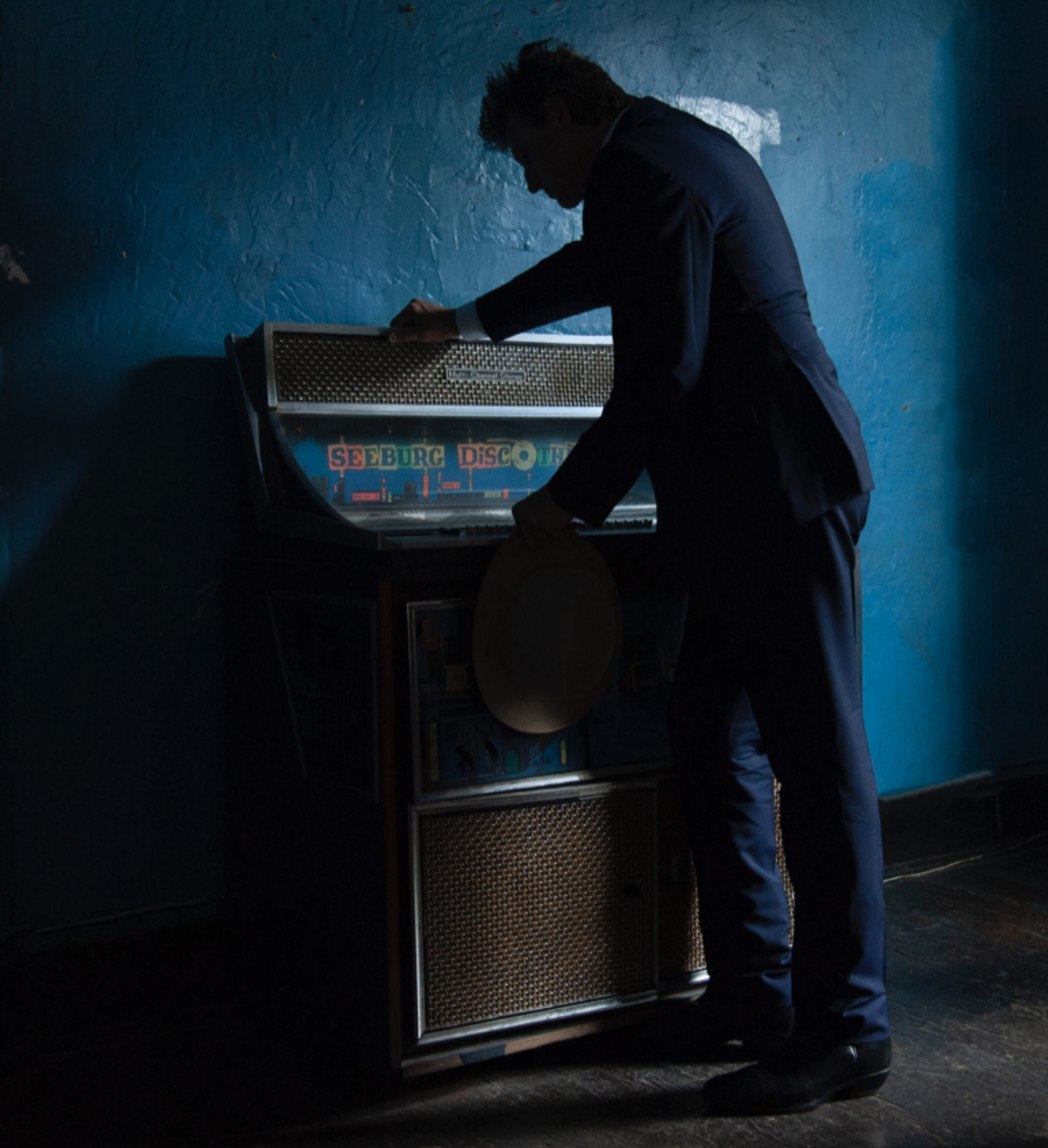 Without any fanfare, Paul Burch tells the Scene the secret to his success: “I don’t really know what ‘retro’ is. It sounds like you’re trying to put on an act or something.” Beginning between gigs as Lambchop’s drummer during their transformation from tongue-in-cheek countrypolitans to sonic explorers, Burch has been making records the same way for nearly 20 years, backed by a loose association of musicians who call themselves The WPA Ballclub. Blending fine ingredients that also happen to make up early rock ‘n’ roll, the group isn’t out to re-create some magic lost when Buddy Holly and Fats Domino disappeared from the charts. They’re after the sound of top-shelf players having a good time making music, and that makes all the difference.
Without any fanfare, Paul Burch tells the Scene the secret to his success: “I don’t really know what ‘retro’ is. It sounds like you’re trying to put on an act or something.” Beginning between gigs as Lambchop’s drummer during their transformation from tongue-in-cheek countrypolitans to sonic explorers, Burch has been making records the same way for nearly 20 years, backed by a loose association of musicians who call themselves The WPA Ballclub. Blending fine ingredients that also happen to make up early rock ‘n’ roll, the group isn’t out to re-create some magic lost when Buddy Holly and Fats Domino disappeared from the charts. They’re after the sound of top-shelf players having a good time making music, and that makes all the difference.
Burch and the Ball Club’s latest album, Fevers, was released Nov. 5 via Plowboy Records, a growing indie label established by former Dead Boy Cheetah Chrome, author and Belmont University music-business professor Don Cusic, and Shannon Pollard, grandson of country legend Eddy Arnold. Plowboy’s catalog — which includes Bobby Bare’s Darker Than Light and J.D. Wilkes and the Dirt Daubers’ Wild Moon — showcases eclectic tastes integrated fully into the artists’ identities, making Fevers a natural fit. With ease and grace, the album covers a broad swath of what the band calls “American Groove,” ranging from the R&B/rockabilly stew of “Couldn’t Get a Witness” to the Cajun-blackened ode to fishing “Sac au Lait (Acadia’s Song)” and the Latin heart of “Sagrada.” There’s also a fine take on “Ocean of Tears,” in which the band pulls back the throttle just a hair on the swinging original. Meanwhile, Burch and duet partner Kelly Hogan draw out the melancholy beneath Tennessee Ernie Ford and Kay Starr’s knowing wink, revealing new layers of complexity in an old favorite without changing its soul.
The version of the Appalachian folk standard “Cluck Old Hen” that opens Fevers encapsulates several of the group’s defining philosophies, or “anti-philosophies” as Burch calls them. He first heard the venerable fiddle tune on a recording by longtime collaborator Fats Kaplin. Inspired by soundtracks of films by legendary Indian director Satyajit Ray, Burch recast it as a hybrid Appalachian raga, fueled by pianist/accordionist Jen Gunderman’s newly acquired harmonium.
“We sat on the floor of the studio and recorded a lot of slower versions, and the fast one ended up being the one,” says Burch. “Not all of the record sounds like that, but that’s the spirit we tend to work in. I usually know what I’m looking for, but I try not to show my hand. I want to see if the way that I’m playing and the way that I’m singing can kind of lead [the band] in the direction I’m going.”
Being open to experimentation and focusing on the performance as a whole may not be a more lucrative path than crafting a song perfect layer by perfect layer, but maybe that subtly dynamic feel explains why we come back to Burch’s records over and over. A key part of The WPA Ballclub’s sound comes from the group recording live to tape at Burch’s Pan American Sound Studio.
“I have very deliberate ways of working, but the deliberateness is to trust that if you focus on the music [you’ll get it right],” Burch explains.
“It seems trite to say that, but I’ve seen how screwed up a lot of recording sessions are, and how a lot of people — producers, managers, somebody — put a lot of obstacles in the way of musicians actually playing together. The thing that’s distinctive about the people who are part of The WPA Ballclub is that they all have an individual style, and in a place like Nashville, there’s a lot of pressure to sound like everybody else. No matter how groovy someone is, when it comes down to it, they tend to want to make a record that sounds produced and super-professional. My idea of professional is that if the musicians are great and you know the song, how can it not be professional?”
Starting Jan. 8, Burch and band will take to The Stone Fox to begin their annual winter residency. Besides being a showcase for The WPA Ballclub and the guests he chooses, the sets each Wednesday will include old favorites, cuts from Fevers and songs from a forthcoming project, a biographical sketch of Jimmie Rodgers from The Singing Brakeman’s own point of view.
“It’s like spring training,” says Burch. “You get the band in shape, you get a chance to stay busy. It’s a chance for us to enjoy each other’s company and figure out what will work on stage and what will change. I wish more people did them!”
Article link:Without any fanfare, Paul Burch tells the Scene the secret to his success: “I don’t really know what ‘retro’ is. It sounds like you’re trying to put on an act or something.” Beginning between gigs as Lambchop’s drummer during their transformation from tongue-in-cheek countrypolitans to sonic explorers, Burch has been making records the same way for nearly 20 years, backed by a loose association of musicians who call themselves The WPA Ballclub. Blending fine ingredients that also happen to make up early rock ‘n’ roll, the group isn’t out to re-create some magic lost when Buddy Holly and Fats Domino disappeared from the charts. They’re after the sound of top-shelf players having a good time making music, and that makes all the difference.
Burch and the Ball Club’s latest album, Fevers, was released Nov. 5 via Plowboy Records, a growing indie label established by former Dead Boy Cheetah Chrome, author and Belmont University music-business professor Don Cusic, and Shannon Pollard, grandson of country legend Eddy Arnold. Plowboy’s catalog — which includes Bobby Bare’s Darker Than Light and J.D. Wilkes and the Dirt Daubers’ Wild Moon — showcases eclectic tastes integrated fully into the artists’ identities, making Fevers a natural fit. With ease and grace, the album covers a broad swath of what the band calls “American Groove,” ranging from the R&B/rockabilly stew of “Couldn’t Get a Witness” to the Cajun-blackened ode to fishing “Sac au Lait (Acadia’s Song)” and the Latin heart of “Sagrada.” There’s also a fine take on “Ocean of Tears,” in which the band pulls back the throttle just a hair on the swinging original. Meanwhile, Burch and duet partner Kelly Hogan draw out the melancholy beneath Tennessee Ernie Ford and Kay Starr’s knowing wink, revealing new layers of complexity in an old favorite without changing its soul.
The version of the Appalachian folk standard “Cluck Old Hen” that opens Fevers encapsulates several of the group’s defining philosophies, or “anti-philosophies” as Burch calls them. He first heard the venerable fiddle tune on a recording by longtime collaborator Fats Kaplin. Inspired by soundtracks of films by legendary Indian director Satyajit Ray, Burch recast it as a hybrid Appalachian raga, fueled by pianist/accordionist Jen Gunderman’s newly acquired harmonium.
“We sat on the floor of the studio and recorded a lot of slower versions, and the fast one ended up being the one,” says Burch. “Not all of the record sounds like that, but that’s the spirit we tend to work in. I usually know what I’m looking for, but I try not to show my hand. I want to see if the way that I’m playing and the way that I’m singing can kind of lead [the band] in the direction I’m going.”
Being open to experimentation and focusing on the performance as a whole may not be a more lucrative path than crafting a song perfect layer by perfect layer, but maybe that subtly dynamic feel explains why we come back to Burch’s records over and over. A key part of The WPA Ballclub’s sound comes from the group recording live to tape at Burch’s Pan American Sound Studio.
“I have very deliberate ways of working, but the deliberateness is to trust that if you focus on the music [you’ll get it right],” Burch explains.
“It seems trite to say that, but I’ve seen how screwed up a lot of recording sessions are, and how a lot of people — producers, managers, somebody — put a lot of obstacles in the way of musicians actually playing together. The thing that’s distinctive about the people who are part of The WPA Ballclub is that they all have an individual style, and in a place like Nashville, there’s a lot of pressure to sound like everybody else. No matter how groovy someone is, when it comes down to it, they tend to want to make a record that sounds produced and super-professional. My idea of professional is that if the musicians are great and you know the song, how can it not be professional?”
Starting Jan. 8, Burch and band will take to The Stone Fox to begin their annual winter residency. Besides being a showcase for The WPA Ballclub and the guests he chooses, the sets each Wednesday will include old favorites, cuts from Fevers and songs from a forthcoming project, a biographical sketch of Jimmie Rodgers from The Singing Brakeman’s own point of view.
“It’s like spring training,” says Burch. “You get the band in shape, you get a chance to stay busy. It’s a chance for us to enjoy each other’s company and figure out what will work on stage and what will change. I wish more people did them!”
Article Link: Click Here
To Buy Fevers: Click Here
